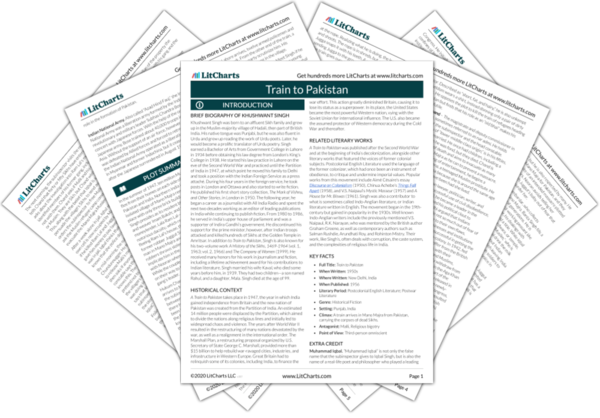The Muslim League Quotes in Train to Pakistan
“Sir, the Babu’s name is Iqbal Singh. He is a Sikh. He has been living in England and had his long hair cut.” The subinspector fixed the head constable with a stare and smiled. “There are many Iqbals. I am talking of a Mohammed Iqbal, you are thinking of Iqbal Singh. Mohammed Iqbal can be a member of the Muslim League.” “I understand, sir,” repeated the head constable, but he had not really understood. He hoped he would catch up with the scheme in due course. “Your orders will be carried out.”

Unlock explanations and citation info for this and every other Train to Pakistan quote.
Plus so much more...
Get LitCharts A+Muslims sat and moped in their houses. Rumors of atrocities committed by Sikhs on Muslims in Patiala, Ambala and Kapurthala, which they had heard and dismissed, came back to their minds. They had heard of gentlewomen having their veils taken off, being stripped and marched down crowded streets to be raped in the marketplace … They had heard of mosques being desecrated by the slaughter of pigs on the premises, and of copies of the holy Koran being torn up by infidels. Quite suddenly every Sikh in Mano Majra became a stranger with an evil intent … For the first time, the name Pakistan came to mean something to them—a haven of refuge where there were no Sikhs.
The Sikhs were sullen and angry. “Never trust a Mussulman,” they said. The last Guru had warned them that Muslims had no loyalties. He was right. All through the Muslim period of Indian history, sons had imprisoned or killed their own fathers and brothers had blinded brothers to get the throne. And what had they done to the Sikhs? Executed two of their Gurus, assassinated another and butchered his infant children; hundreds of thousands had been put to the sword for no other offense than refusing to accept Islam; their temples had been desecrated by the slaughter of kine; the holy Granth had been torn to bits. And Muslims were never ones to respect women. Sikh refugees had told of women jumping into wells and burning themselves rather than fall into the hands of Muslims. Those who did not commit suicide were paraded naked in the streets, raped in public, and then murdered. Now a trainload of Sikhs massacred by Muslims had been cremated in Mano Majra.
He felt a little feverish, the sort of feverishness one feels when one is about to make a declaration of love. It was time for a declaration of something. Only he was not sure what it should be. Should he go out, face the mob and tell them in clear ringing tones that this was wrong—immoral? Walk right up to them with his eyes fixing the armed crowd in a frame—without flinching, without turning, like the heroes on the screen who became bigger and bigger as they walk right into the camera. Then with dignity fall under a volley of blows, or preferably a volley of rifleshots. A cold thrill went down Iqbal’s spine. There would be no one to see this supreme act of sacrifice. They would kill him just as they would kill the others … They would strip him and see. Circumcised, therefore Muslim.












